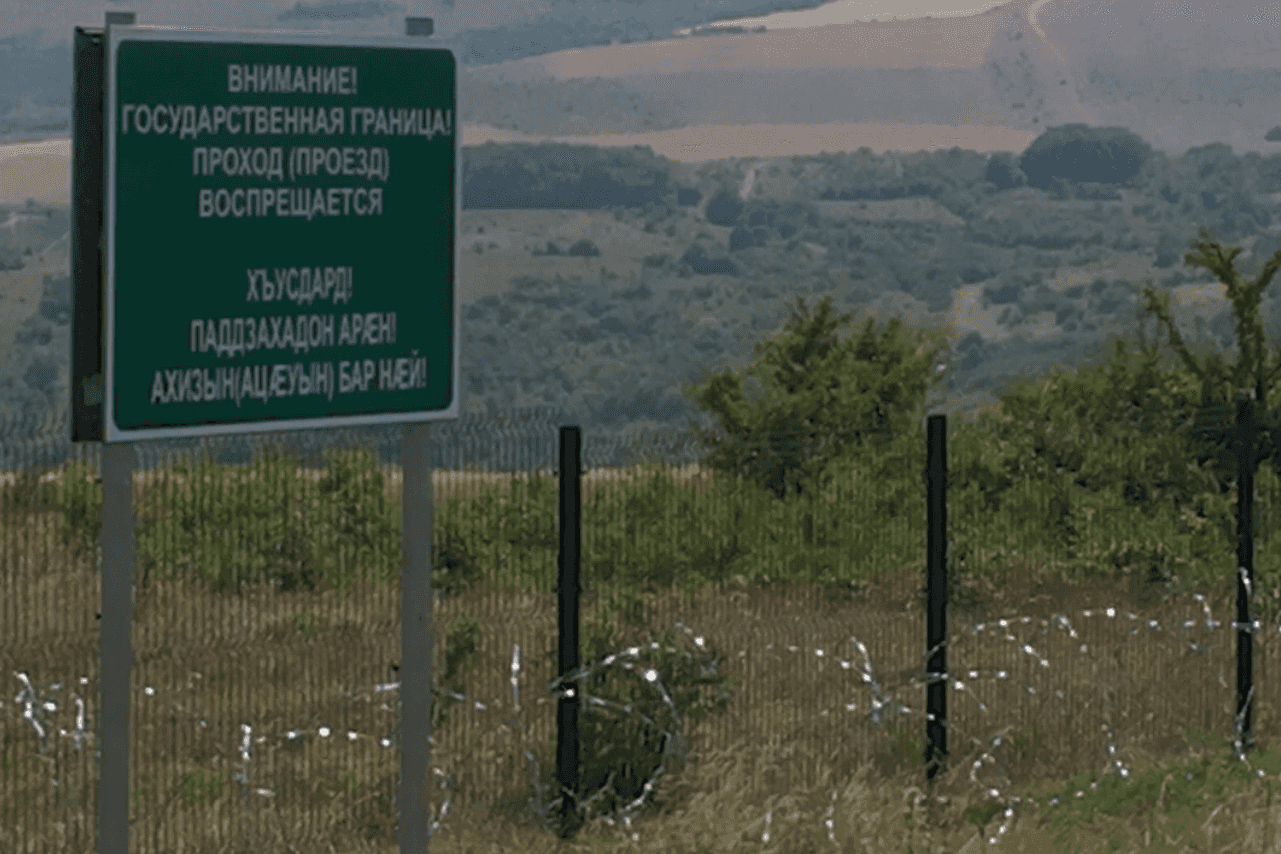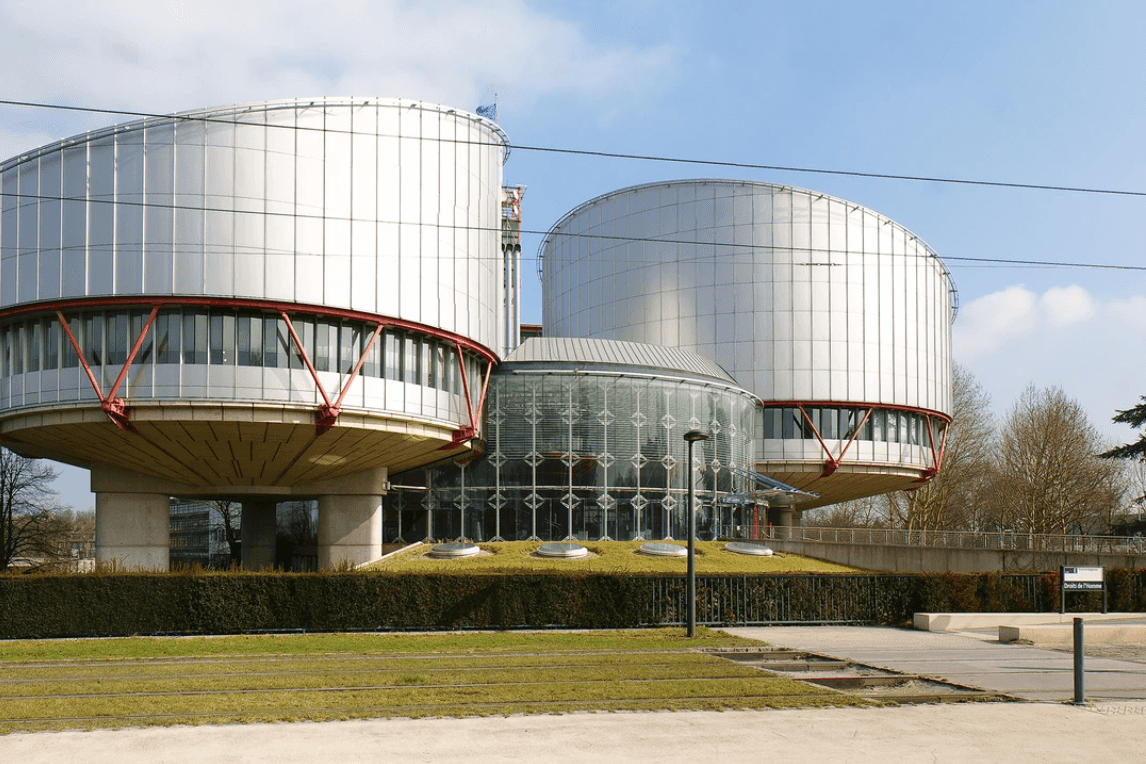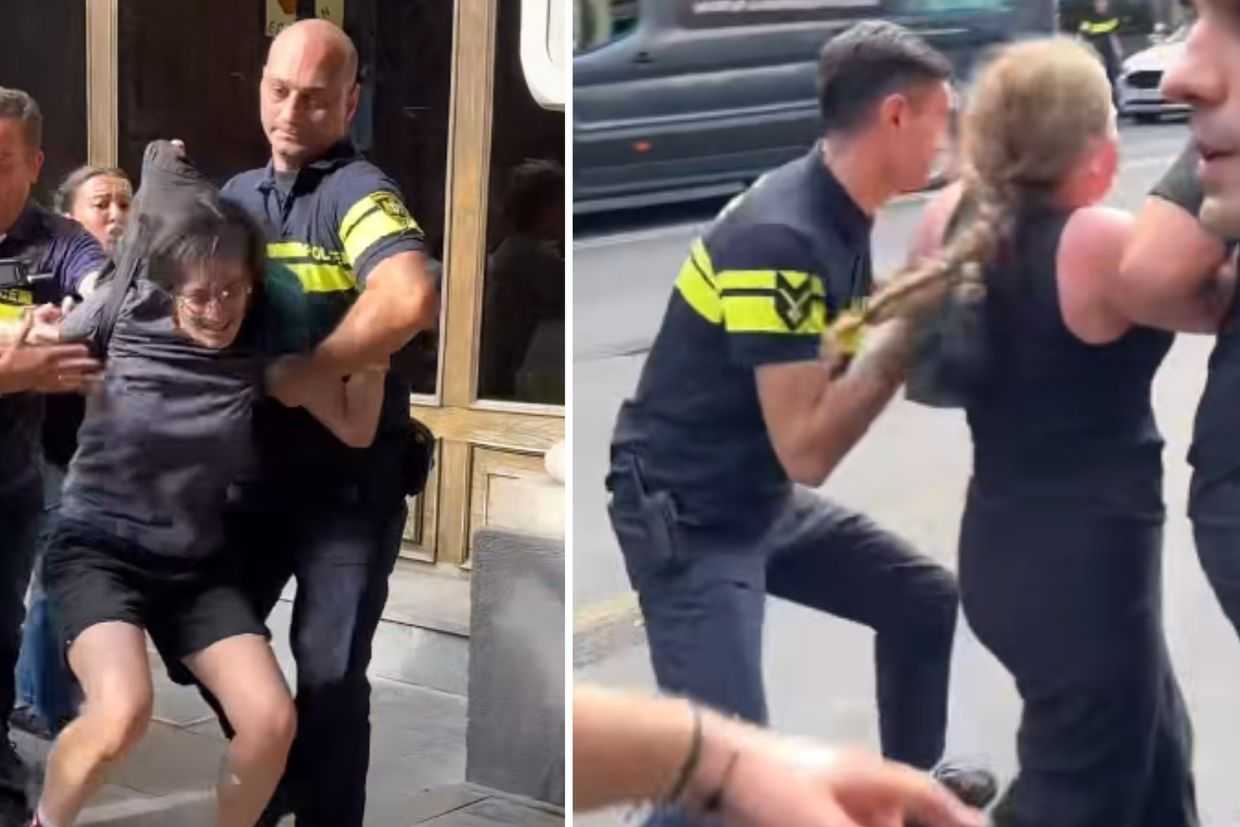
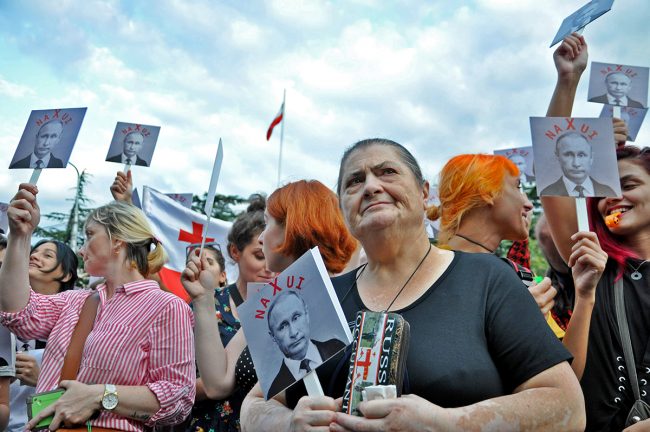
 On Wednesday, commemorations were held in Tbilisi, Tskhinvali (Tskhinval), and elsewhere commemorating the 10th anniversary of the August 2008 War. As the presidents of three countries gathered in Tbilisi, Georgian presidential candidate Salome Zurabishvili described the war as ‘recklessness, the obsessions of a deranged president, or confusing collusion with a centuries-long enemy’.
On Wednesday, commemorations were held in Tbilisi, Tskhinvali (Tskhinval), and elsewhere commemorating the 10th anniversary of the August 2008 War. As the presidents of three countries gathered in Tbilisi, Georgian presidential candidate Salome Zurabishvili described the war as ‘recklessness, the obsessions of a deranged president, or confusing collusion with a centuries-long enemy’.
On 7 August, several hundred people gathered outside the former Russian embassy in Tbilisi to protest ‘Russian aggression’ against Georgia. Protesters carried barbed wire fences, a reference to fences erected by Russian border agents around South Ossetia, and banners saying ‘Stop the land grab’.
Protesters said Russia had ignored fundamental principles of international law with its military invasion of a sovereign country.
‘The 2008 conflict was a starting point for a gradually shifting, unrecognised, de facto border and the seizure of Georgian territories. The Russian Federation violated the agreement reached after the war and seized more than 100 Georgian villages throughout its crawling occupation. It killed Giga Otkhozoria and Archil Tatunashvili. Peaceful residents are often kidnapped and blackmailed. The war continues, we will not accept occupation’, the rally organisers said on Facebook.
‘The obsessions of a deranged president’
Both during the August War and in its aftermath, then-president Mikheil Saakashvili faced intense criticism from some in Georgia. Presidential candidate Salome Zurabishvili, a long-time critic of Saakashvili, has been particularly vocal in debates that routinely resurface on the conflict’s anniversary. Zurabishvili came under fire for reiterating on 6 August that ‘although Russia started a war a century ago’, in 2008 it was Georgia who, provoked by Russia, ‘launched it’.
During her visit to the Mukhatgverdi Cemetery to pay tribute to Georgian soldiers killed in the August War, Zurabishvili doubled down on her position.
She said she wasn’t sure how to explain the ‘provocation [by Russia] and massive bombing of our own people [in Tskhinvali] without any hope for help [from outside Georgia]’, whether it was ‘recklessness, the obsessions of a deranged president, or confusing collusion with a centuries-long enemy’. Georgian Dream leaders commented the same day that they did not share her position.
‘Unwavering support’
According to the Ministry of Social Protection, there are around 280,000 internally displaced people from Abkhazia and South Ossetia in Georgia, up to 21,000 of them displaced during the 2008 war.
As Georgia marked the 10th anniversary of the August War, Tbilisi hosted the presidents and foreign ministers of Lithuania, Latvia, and Poland, as well as Ukraine’s Vice Prime Minister.
The three foreign ministers and Ukrainian vice prime minister paid tribute at the Mukhatgverdi cemetery to ‘the heroes who died for the unity of Georgia’. They also held meetings with Georgian President Giorgi Margvelashvili, Prime Minister Mamuka Bakhtadze, and Parliamentary Speaker Irakli Kobakhidze and visited the village of Odzisi, which borders South Ossetia.
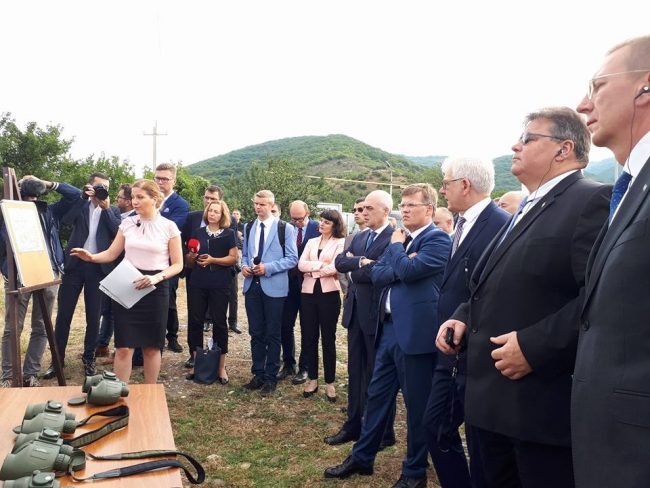
The group issued a joint communiqué reaffirming their countries’ ‘unwavering support for Georgia’s sovereignty, independence, and territorial integrity’. They criticised Russia’s ‘artificial recognitions’ of South Ossetian and Abkhazian independence in 2008 and its continued efforts to ‘further integrate them into the Russian economic, social, and military spheres’. ‘We deplore these efforts and will never recognise their consequences’, reads the communiqué.
They also criticised Russia for failing to implement the 12 August 2008 ceasefire agreement, which included withdrawal of Georgian and Russian forces to their pre-conflict positions, or ‘engage in a constructive manner in the Geneva International Discussions’. These discussions were launched in October 2008 to address the security, human rights, and humanitarian challenges that emerged as a result of the armed conflicts in Georgia.
Speaking at a roundtable discussion organised by the Georgian Foreign Ministry, Bakhtadze condemned Russia’s erection of border fences around South Ossetia. ‘In the 21st century, while humanity tries to erect as few barriers to human relations as possible, we have barbed wires on our territory’, said Bakhtadze.
Joint Communique by 🇵🇱🇱🇻🇱🇹🇺🇦 commemorating the decade since the Russian aggression against #Georgia 🇬🇪 pic.twitter.com/TnyrHj2yfD
— Ministry of Foreign Affairs 🇵🇱 (@PolandMFA) August 7, 2018
The Group of Friends of Georgia at the OSCE — Canada, Estonia, Latvia, Lithuania, Poland, Romania, Sweden, the Czech Republic, Ukraine, the UK, and the US — issued a joint statement reaffirming their ‘full support for Georgia’s sovereignty and territorial integrity’ and urging Russia ‘to reverse its recognition of the independence of Georgia’s Abkhazian and South Ossetian regions’.
In a separate statement, the US Embassy to Georgia noted that ‘Georgians displaced by the war have never been able to return to their homes, and residents of the occupied territories have been cut off from the country’s remarkable economic and political progress of the past decade’. The US vowed to continue its support of ‘Georgia’s sovereignty and territorial integrity within its internationally recognised borders’, ending their message with ‘Georgia, we are with you’.
The Georgian Foreign Ministry also issued a statement expressing ‘great concern that the security and human rights situation in the occupied territories has further deteriorated’ due to continuous ‘fortification of the occupation lines, as well as kidnappings and illegal detentions by Russian FSB personnel’. They underlined the Georgian Government’s commitment to peaceful conflict resolution, highlighting its new peace initiative ‘A Step to a Better Future’.
The initiative, aimed at simplifying trade and educational relations ‘with people in Abkhazia and South Ossetia’, including through engagement with the EU, was unveiled in April but met with little enthusiasm by Abkhazian and South Ossetian authorities.
[Read more about the Georgian initiative on OC Media: Georgia unveils ‘unprecedented’ peace initiative for Abkhazia, South Ossetia]
In June, in parallel to ‘A Step to a Better Future’, Georgia released the ‘Otkhozoria–Tatunashvili list’, sanctioning individuals accused or convicted in absentia by Georgian authorities for ‘the murder, kidnapping, torture, and inhumane treatment’ of Georgian citizens in Abkhazia and South Ossetia, and for the cover-up of these crimes, since 1991.
Also affirming support for Georgia’s territorial integrity, the European Union’s declaration on the 10th anniversary of the war stressed that Georgia had ‘strengthened its democratic institutions and undertaken reforms in the rule of law’, calling the country ‘a model of democratic stability in the region’.
Commemorations in South Ossetia and Abkhazia
South Ossetian authorities marked the anniversary by laying flowers on monuments dedicated to soldiers killed in the conflict. On 8 August, two new monuments dedicated to ‘war heroes’ of the 2008 conflict were unveiled in Tskhinvali.
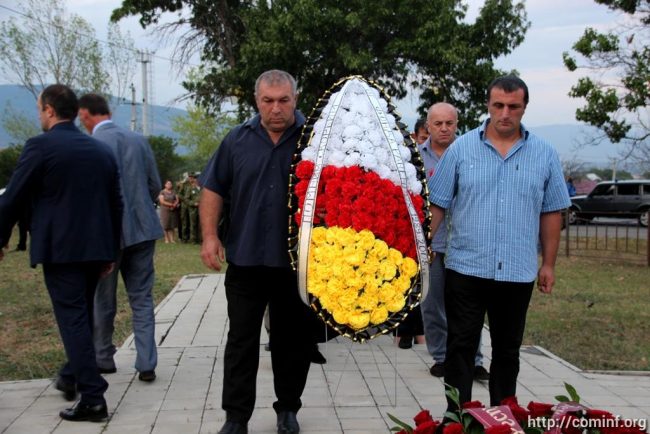
A commemorative rally was organised in Tskhinvali and attended by President Anatoly Bibilov, MPs, and government ministers. Participants lit candles and held a moment of silence for victims of the war.
On 7 August, Bibilov called recent claims by Saakashvili — that Georgia did not intend to engage in a military conflict in August 2008 — ‘inadequate’, and expressed hope that he would face prosecution as a war criminal.
In an address to his South Ossetian counterpart, Abkhazian leader Raul Khadzhimba called Georgia’s actions during the war an ‘attempt to barbarically annihilate the Ossetian nation’. He also thanked Russia for ‘bringing Georgia to peace’, thanks to which ‘the Abkhazian and Ossetian people now live in peace’.
On 8 August, the Abkhazian Foreign Ministry said Georgia had ‘failed to draw any conclusions from the tragic events a decade ago’, as according to them, Georgian authorities are still pursuing their ‘destructive strategy to isolate’ Abkhazia and South Ossetia from the world. Authorities from both regions also criticised the NATO Noble Partner military drills, launched on 1 August, as a sign of militarisation and a threat to peace in the region.
‘Broken free of the American leash’
On 6 August, Russian Prime Minister Dmitry Medvedev warned Georgia’s accession to NATO could trigger ‘a terrible conflict’. In an interview with the Kommersant FM radio station, Medvedev said the 2008 war was ‘not inevitable’ and could have been avoided.
Medvedev’s comments came in light of July’s NATO summit in Brussels, in which it was asserted that ‘Georgia will become a member of the Alliance’. This declaration reiterated the bloc’s support for ‘the territorial integrity and sovereignty of Ukraine, Georgia, and the Republic of Moldova’ and called on Russia ‘to reverse its recognition of the Abkhazian and South Ossetian regions of Georgia as independent states’.
After the summit, Russian President Vladimir Putin said in an interview with Fox News that if NATO were to add either Ukraine or Georgia to the alliance, it would be a ‘direct and immediate threat to [Russia’s] national security’.
‘Moving this NATO infrastructure towards our borders would be a threat, and our reaction would be extremely negative’, said Putin.
Sergey Ivanov, former Russian Defence Minister and Deputy Prime Minister during the conflict in August 2008, said in an interview with Kommersant that eventually ‘the West’ had to acknowledge that its ‘satellite’, Saakashvili, had ‘broken free of the American leash’.
Ivanov said the former President of Georgia broke his promise ‘not to cross the red line’, something that then US Secretary of State Condoleezza Rice had allegedly assured Ivanov he would not do. ‘In private conversations, Condoleezza Rice told me that the US was not behind these events [Georgia’s military advance into South Ossetia], that they were Saakashvili’s initiative and that he was a war criminal’, Lavrov said.
In her 2011 memoir No Higher Honor, Rice recalls warning Saakashvili to avoid a conflict with Russia. ‘Mr. President, whatever you do, don’t let the Russians provoke you. You remember when President Bush said that Moscow would try to get you to do something stupid. And don’t engage Russian military forces. No one will come to your aid, and you will lose,’ [she] said sternly [to Saakashvili]’.
In a 2013 interview with Georgian TV station Rustavi 2, Saakashvili did not deny Rice’s account when questioned about it. He also criticised the West for its ‘lack of reaction’ to the alleged Russian military buildup before 7 August. More recently, in a 7 August interview with Echo of Moscow, Saakashvili claimed he ‘raised his voice’ in a conversation with then US President George W Bush over his lack of commitment to ‘prevent the Soviet Union from reviving’, as he expected Russian forces were planning to remove him during a military invasion.
On 7 August, the Russian Foreign Ministry stated it had used its armed forces in 2008 ‘to enforce peace’ in response to a ‘large-scale Georgian attack on Russian peacekeeping units’ and ‘the direct threat to the life of Russian citizens in South Ossetia’ following Georgia’s shelling of Tskhinvali on the night of 7 August.
‘Crimes against humanity’
The large-scale military confrontation between Georgian and South Ossetian forces started in early August 2008, followed by a Georgian advance into Tskhinvali and Russia’s ground and aerial intervention. After Russian forces paralysed the country’s military and communications infrastructure and took effective control over its strategic points, Georgia lost control of all of the areas in South Ossetia and Abkhazia it had previously controlled. On 12 August, Russia and Georgia signed an EU-brokered ceasefire agreement, the terms of which are still disputed by the two signatories. In September, Russia recognised South Ossetia and Abkhazia as independent states.
In a 2009 report, Human Rights Watch concluded that Georgian forces had used ‘indiscriminate and disproportionate force’ during their ground and artillery assaults on South Ossetia, Russian forces had violated international humanitarian law with ‘indiscriminate aerial, artillery, and tank fire strikes that killed and wounded many civilians’, and both Russian and Georgian forces had used cluster munitions that caused civilian deaths. The organisation also said that the South Ossetian militia, with permission and sometimes aid from Russian forces, ‘attempted to ethnically cleanse [Georgian-populated] villages’, constituting crimes against humanity.
In a 2009 report commissioned by the Council of the European Union, an independent fact-finding mission questioned the legality of Georgia’s military advance into South Ossetian territories, and found the shelling of Tskhinvali, ‘which marked the beginning of the large-scale armed conflict’, unjustifiable under international law.
The Tagliavini report, led by Swiss diplomat Heidi Tagliavini, was unable to establish that Georgia had attacked Russian peacebuilding forces. Russia had used the alleged assault on their peacekeepers, together with claims of pursuing peacekeeping reinforcement, as justification for its invasion into Georgia-controlled territory. The report found this to be an invalid reason for Russian military action beyond South Ossetia.
For ease of reading, we choose not to use qualifiers such as ‘de facto’, ‘unrecognised’, or ‘partially recognised’ when discussing institutions or political positions within Abkhazia, Nagorno-Karabakh, and South Ossetia. This does not imply a position on their status.



